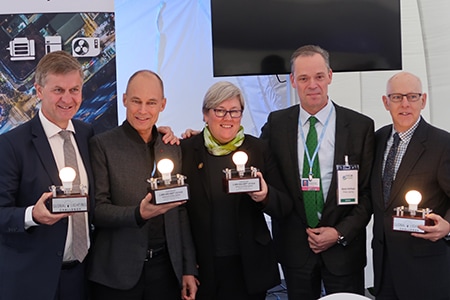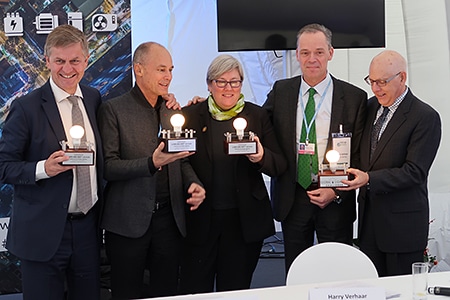- First company to break through the one billion LED milestone says it is on track to meet commitment of two billion LED lamps and luminaires ahead of 2020 target
- Savings realized equivalent to the energy generated by 30 medium-sized coal-fired power stations and CO2 emissions from 12 million cars
- Philips Lighting calls on governments to commit to 100% energy-efficient lighting targets in buildings and street lighting
Eindhoven, the Netherlands - Philips Lighting (Euronext: LIGHT), the world leader in lighting, has delivered one billion LED lamps and luminaires as part of its commitment to the ‘Global Lighting Challenge’, the Clean Energy Ministerial campaign to deploy ten billion high-efficiency light points to improve energy efficiency around the world. In doing so, it has pushed through the halfway mark of its target to deliver two billion by 2020.
Philips Lighting is the first company to reach this milestone, which marks the latest progress in the global transition to energy-efficient lighting, a vital measure in slowing climate change. In December 2006, when Philips Lighting called for the global phase-out of incandescent light bulbs, lighting accounted for 19% of global electricity consumption. This level was down to 15% in 2015 when the Paris Agreement was signed, and is on track to further decline to 8% by 2030.
“This milestone demonstrates that we can successfully drive the transition from conventional lighting technologies to LED, which can make a significant contribution to global climate change objectives. Energy efficiency is the low hanging fruit – today, energy efficiency improves by about 1.5% every year but simply doubling this to 3% per year would set us on a sustainable path,” said Harry Verhaar, Head of Global Public and Government Affairs at Philips Lighting.
“When compared to the outdated lighting sources these LEDs replaced, the energy savings achieved are equivalent to the energy generated by 30 medium-sized coal-fired power stations and the CO2 reductions achieved are equivalent to the emissions produced by 12 million cars. The impact is real and measurable,” Verhaar continued.
A simple switch to LED lamps will result in significant energy savings, and when combined with connected lighting systems these savings are amplified, with the potential to reduce electricity used for lighting by up to 80%.
The 1 billionth LED lamp was presented to a group of representatives from international governmental and non-governmental organizations at a special ceremony in Bonn attended by many influential advocates of environmental change, including representatives from the UN, the International Energy Agency (IEA) and the Global Environment Facility, as part of the United for Efficiency conference.
Rachel Kyte, Chief Executive Officer and Special Representative of the UN Secretary-General for Sustainable Energy for All, said: “In Paris numerous companies made commitments to a low carbon world. Philips Lighting has turned words into action. In just two years, they are halfway to their 2020 goal of delivering 2 billion LED bulbs. One billion LEDs sold equals the energy consumption of 300,000 households. Philips Lighting shows that together we can go further, faster.”
At the event, Philips Lighting called on governments worldwide to join them in its goal to make the world more energy-efficient by making the following commitments:
- By 2020 all new buildings should be installed with LED or equivalent energy-efficient lighting
- By 2025 all street lighting should be LED or equivalent energy-efficient lighting
- By 2030 all existing corporate buildings should be fitted with LED or equivalent energy-efficient lighting
The Global Lighting Challenge is a Clean Energy Ministerial campaign to reach cumulative global sales of ten billion high-efficiency, high-quality, and affordable advanced lighting products, such as LED lamps. The transition to energy-efficient lighting could be one of the most significant short-term initiatives to reduce global greenhouse gas emissions.
Indeed, a recent report1 published by the International Energy Agency highlighted that in 2016, the world would have used 12% more energy had it not been for energy efficiency improvements since 2000 – equivalent to adding another European Union in the global energy market.

